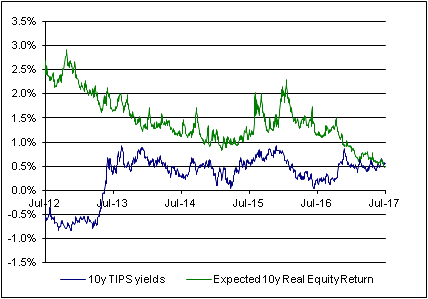I'd like to write about something that’s been bothering me a bit recently. It’s about the Fed’s impending decision to start drawing down its balance sheet over some number of years (whether or not we have an announcement about that at today’s meeting, it seems likely that “balance sheet reduction” is on tap for later this year). Something had been gnawing at me about that, and until now I haven’t been able to put my finger on it.
It concerns the ‘portfolio balance channel.’ This bit of Fed arcana is part of how the central bank explained the importance of the practice of buying trillions in Treasury bonds. Remember that back when the Fed first started doing Large-Scale Asset Purchases (LSAP), they were concerned that a lack of ‘animal spirits’ were causing investors to shy away from taking risk in the aftermath of the credit crisis. Although this is entirely normal, to the FOMC it was something to be corrected – if people and firms aren’t willing to take risk, then it is difficult for the economy to grow.
So, as the Fed explained it, part of the reason that they were buying Treasuries is that by removing enough safe securities from the market, people would be forced to buy riskier securities. When QE1 started, 10-year TIPS were yielding 2.5%, and that’s a pretty reasonable alternative to equities in a high-risk environment. But the Fed’s ministrations eventually pushed TIPS yields (along with other yields, but by focusing on real rates we can abstract from the part of that decline that came from declining inflation expectations rather than the forced decline in real yields) down to zero in 2011, and eventually deeply negative.
As expected, despite the risk aversion being experienced by investors they began to move into equities as the “only game in town” – think about how many times you’ve heard people lament they own equities because ‘there’s nothing else worth owning’? The eventual result, of course, was that expected returns to equities began to fall in line with the (manipulated) expected returns to other securities, until we got the current situation where, according to our calculations, TIPS now have a higher expected real return than equities again (but at a much lower level).

What was bothering me, of course, was that shrinking the balance sheet also implies reversing the “portfolio balance channel.” Via QE, the Fed forced investors into stocks because there were fewer Treasury securities outstanding; every time the Fed bought $1 of bonds, some fraction of that went into stocks. The reverse must also be true – for every $1 of bonds the Fed sells, some fraction of that money must come out of stocks.
I’m not the first person to note that reducing the balance sheet should be a negative for equities since it “reduces liquidity.” But I was always uncomfortable with the vagueness of the “liquidity” mechanism…after all, lots of people predicted cataclysm when the Fed “tapered” QE. The reversal of the portfolio balance channel, though, is a real effect.
The money to buy the extra bonds that will be on the market – bonds not held by the Fed must be held by someone, after all – will come from somewhere. And some of that “somewhere” will be from equities, some from real estate, some from cash, etc. I don’t know how big an effect it will be, but I know the sign.
